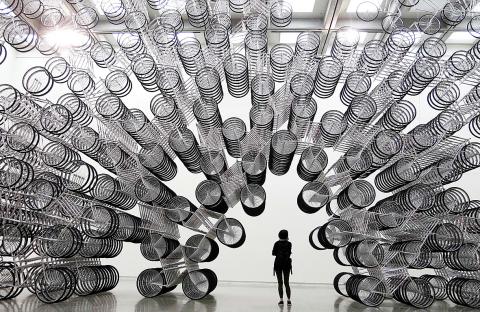Opposition politicians and human rights activists yesterday urged President Ma Ying-jeou (馬英九) to invite Chinese dissident artist Ai Weiwei (艾未未) to Taiwan in conjunction with a solo exhibition of his works that opens at the Taipei Fine Arts Museum today.
“It’s too bad that Ai himself cannot come to Taipei to attend the opening of the exhibition,” Democratic Progressive Party (DPP) Legislator Tien Chiu-chin (田秋堇) said at a news conference.
Since Chinese citizens are now allowed to travel independently to Taiwan, it is rather odd for Ai to be absent from the opening ceremony of his first solo exhibition in Taipei, Tien said.

Photo: Pichi Chuang, Reuters
“We should not remain silent. Both President Ma and Taipei Mayor Hau Lung-bin (郝龍斌) should speak out to push the Chinese authorities to allow Ai to come to Taiwan for the grand ceremony,” she said.
Ai, an outspoken critic of the control the Chinese Communist Party has on Chinese society and censorship in the country, is currently being investigated for tax evasion and has been barred from leaving the country.
He was released in June after an almost three-month detention, which sparked outrage worldwide. He took the top spot in Art Review magazine’s recently released annual list of the world’s most powerful figures in the art world.
Tien called on Ma to formally invite Ai to Taiwan as a free independent traveler (FIT). The FIT program for Chinese tourists, in place since June 28, is a program open to residents of select cities in China and allows them to travel independently, as opposed to in a tour group.
DPP Taipei City Councilor Lee Chien-chang (李建昌) echoed Tien’s call.
“Only when people from both sides are able to engage with each other freely will President Ma’s efforts to promote peaceful development across the Taiwan Strait be meaningful,” Lee said.
“Since the FIT program is already in place, why is it that the Taiwanese government feared letting Ai come to Taiwan to see his own exhibition?” Taiwan Association for China Human Rights executive council member Ruan Ming (阮銘) asked, calling on Taiwanese to let the Chinese government know that they hoped Ai could have visited Taiwan.
Dubbed “Ai Weiwei Absent,” the exhibition will feature 21 works, including photographs, installation pieces, videos, 12 bronze heads representing Chinese zodiac symbols and a new piece consisting of about 1,000 bicycles reflecting China’s social changes.
Taipei Fine Arts Museum deputy director Liu Ming-hsing (劉明興) recently said that Ai was very excited to stage a large-scale solo exhibition in Taiwan.
“We invited him to attend the opening ceremony of the exhibition at the museum,” Liu said. “So far, he hasn’t been able to give us a definite response.”
Museum officials earlier this month said that Ai’s wife, Lu Qing (路青), plans to visit Taiwan early next month.
Translated by Jake Chung, Staff Writer

Chinese Nationalist Party (KMT) Chairman Eric Chu (朱立倫), spokeswoman Yang Chih-yu (楊智伃) and Legislator Hsieh Lung-chieh (謝龍介) would be summoned by police for questioning for leading an illegal assembly on Thursday evening last week, Minister of the Interior Liu Shyh-fang (劉世芳) said today. The three KMT officials led an assembly outside the Taipei City Prosecutors’ Office, a restricted area where public assembly is not allowed, protesting the questioning of several KMT staff and searches of KMT headquarters and offices in a recall petition forgery case. Chu, Yang and Hsieh are all suspected of contravening the Assembly and Parade Act (集會遊行法) by holding

PRAISE: Japanese visitor Takashi Kubota said the Taiwanese temple architecture images showcased in the AI Art Gallery were the most impressive displays he saw Taiwan does not have an official pavilion at the World Expo in Osaka, Japan, because of its diplomatic predicament, but the government-backed Tech World pavilion is drawing interest with its unique recreations of works by Taiwanese artists. The pavilion features an artificial intelligence (AI)-based art gallery showcasing works of famous Taiwanese artists from the Japanese colonial period using innovative technologies. Among its main simulated displays are Eastern gouache paintings by Chen Chin (陳進), Lin Yu-shan (林玉山) and Kuo Hsueh-hu (郭雪湖), who were the three young Taiwanese painters selected for the East Asian Painting exhibition in 1927. Gouache is a water-based

Taiwan would welcome the return of Honduras as a diplomatic ally if its next president decides to make such a move, Minister of Foreign Affairs Lin Chia-lung (林佳龍) said yesterday. “Of course, we would welcome Honduras if they want to restore diplomatic ties with Taiwan after their elections,” Lin said at a meeting of the legislature’s Foreign Affairs and National Defense Committee, when asked to comment on statements made by two of the three Honduran presidential candidates during the presidential campaign in the Central American country. Taiwan is paying close attention to the region as a whole in the wake of a

OFF-TARGET: More than 30,000 participants were expected to take part in the Games next month, but only 6,550 foreign and 19,400 Taiwanese athletes have registered Taipei city councilors yesterday blasted the organizers of next month’s World Masters Games over sudden timetable and venue changes, which they said have caused thousands of participants to back out of the international sporting event, among other organizational issues. They also cited visa delays and political interference by China as reasons many foreign athletes are requesting refunds for the event, to be held from May 17 to 30. Jointly organized by the Taipei and New Taipei City governments, the games have been rocked by numerous controversies since preparations began in 2020. Taipei City Councilor Lin Yen-feng (林延鳳) said yesterday that new measures by